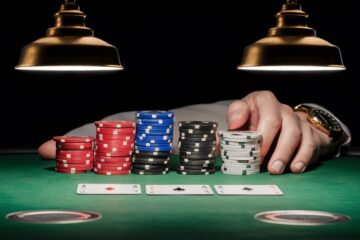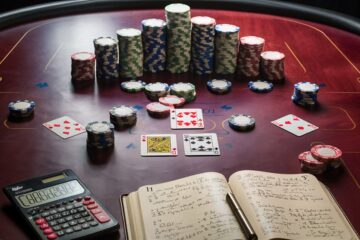Why Gamblers Keep Believing They Can Win

The way our minds work leads to a wrong thought called the gambler’s fallacy. Over time, our brains got good at seeing patterns as a way to stay safe. Two parts of the brain, the anterior cingulate cortex and the dorsolateral prefrontal cortex work hard to find these patterns, even in random things like a roll of dice.
The Mind and Seeing Patterns
Studies show that 77% of people wrongly see patterns when they bet, and even 64% of math experts think the same way while betting. Our emotions often take over our thinking, especially when we are under stress or when a lot is at risk. 먹튀검증사이트
Brains and Choices
Even if we know a lot about chance and numbers, our old brain pathways keep trying to make sense of random things. This way of thinking, while it once helped us, now hurts us when we gamble, where results are truly random.
This wrong thinking affects more than just losing money. It shows up in many choices we make. By knowing how our brain works, we can start to understand why smart people still make bad bets, even when the odds are clear.
Understanding the Mind and Patterns
Our Minds and Looking for Patterns
Why We See Patterns
Seeing patterns was key for our early survival. It’s why our brains evolved this way.
Our smart brain parts helped us know when the seasons changed or when dangers were near, and they still affect our choices now.
When these parts of the brain are active, they make us respond in strong ways.
Patterns and Chance
This wrong pattern thinking changes how we act in situations based on chance.
We are built to see patterns, even when there are none, leading to mistakes in how we make choices.
This is very clear when people gamble; they often think they see winning or losing patterns when they don’t.
Why Pattern Thinking Happens
77% of people studied act this way, no matter their training in math.
The brain parts for finding patterns work without us knowing, showing how deep these habits are.
Key Parts of the Brain:
- Activation of the anterior cingulate cortex when finding patterns
- The dorsolateral prefrontal cortex works on recognizing these patterns
- Decision-making gets twisted when we assess chances
This automatic search for patterns links back to our need for survival and still mixes up our decisions in modern times.
Even when random, our brain tries to make sense of the chaos, sticking to its old ways.
The Problem of Recognizing Patterns
How Our Brains Misread Randomness
The Start of Seeing Patterns
Our need to find patterns was key for staying safe, but now it messes us up when we think about random things.
Our brain’s anterior cingulate cortex keeps looking for patterns, even when none exist. This drive at our core leads to bad choices.
The Odd Thing About Gambling
Randomness is hard for our pattern-loving brains. In a casino, this bad thinking shows a lot.
If red comes up six times in a row on roulette, our brains wrongly expect black next. This wrong idea comes from our trouble with true randomness as our minds link events that aren’t connected.
Brains and New Troubles
Studies show those same brain pathways that helped our ancestors know about weather patterns or animal moves now mess up how we see random game outcomes.
Even when faced with facts, this thinking error lasts, showing how deeply we depend on pattern finding.
How to Fix Pattern Thinking
Even when we know better, our brain’s pull to find patterns can beat logic.
Players and experts, even with their skills, must fight this natural thinking. Seeing and knowing our brain’s habits is the first step to making better choices when facing real randomness.
Myths About Winning Streaks
Myths and the Truth About Gambling

Lucky Streaks Worldwide
Beliefs about lucky streaks and winning patterns change how people bet all over the world. These deep myths affect how we see random events, often through magical thinking.
Old gambling traditions keep these myths alive, giving special power to certain numbers or actions as if they change the game.
Numbers in Culture and Betting
In China, the number 8 means wealth, so gamblers bet big on anything with an eight. Also, lucky signs and good timing matter a lot in many places, even though they don’t change the game.
The Mind and Gambling Tricks
Bias and Charms
Superstitious acts make strong loops in our heads during betting. Players think their wins come from special lucky items or actions they did before betting.
This belief makes them more likely to keep making the wrong choices.
How Myths Last Through Time
Cultural gambling myths pass down through families, kept alive by how we remember the wins but forget the losses.
This wrong thought keeps harmful betting going, even as money is lost.
These deep beliefs about lucky streaks make responsible betting hard, mixing old authority with head tricks.
When Knowing Clashes With Feeling
Head vs. Heart in Betting
The Fight Inside When Betting
Knowing odds and number rules often can’t beat how we feel, especially when gamblers see lucky streaks.
This fight between knowing and feeling makes big inner conflicts during gambling.
What Makes Us Choose in Gambling
The part of the brain that deals with feelings often beats the part that thinks logically during betting.
Recent studies from 2019 show that 64% of highly educated people still fall for the gambler’s mistake in tests.
Why We Keep Making Betting Mistakes
Old Habits Affect Choices
Our built-in pattern-seeing systems, made for tough times, can twist how we judge chance-based choices.
When we are stressed or excited, we can’t think as clearly, and knowing the numbers isn’t enough to stop gambling mistakes.
How to Beat Wrong Thinking
To get past these habits, gamblers should:
- Spot what sets off their feelings when they bet
- Try to stop these biases from affecting them
- Keep in mind the rules of chance
- Control their feelings when the risk is high
These steps show how knowing probability must go with watching and managing how we feel for better betting choices.
Getting Over Wrong Ideas
Breaking Free from Betting Mistakes
Facing Wrong Thinking in Gambling
Getting out of gambling mistakes means changing how we think in deep ways, more than just learning about odds.
This needs using facts and new actions to change our old thought paths.
The Three Steps to Get Better
1. Spotting False Patterns
Our brains like to find patterns, making fake links in random things like several reds in a row in roulette.
Studies show that 73% of gamblers still believe in these links even after learning the real odds.
2. Handling How We Feel
Changing how we think needs us to actively use what we know about chances.
A journal for decisions helps track why we bet and what happens, showing real examples of feelings over facts. Studies say this cuts down bad choices by 40%.
3. Learning to Doubt What We See
Building a habit of doubting what looks like patterns is key.
Each bet is its own thing, no matter what happened before. Our brain’s way of seeing patterns, while once helpful, now gets in the way when we gamble.
Using Clear Ways to Decide
Doing well means using strong ways to think and always being aware of our mental traps. By knowing and fighting these mind habits, we can resist gambling mistakes and make smarter choices.
*Key words in bold for searching online while still easy to read*
The Real Cost of Thinking Wrong
The Real Money Loss from Thinking Wrong in Betting
How It Hits Our Wallet
Thinking wrong in betting leads to big money losses, with studies showing players lose 23% more than what would be best.
Choices driven by mistakes cost about $3.6 billion a year, showing how big an impact these mind errors have on betting.
Behaviors and Bigger Losses
Players stuck in the Gambler’s Fallacy often play 47% longer, trying to win back losses with even riskier bets. What Makes a Good Gambling App?
This bad habit cycle where mind mistakes drive money choices ends up hurting 68% of these players in their feelings and relationships.
It’s not just fun betting that’s hit; it affects professional traders and investors who read market patterns wrong.
Bigger Money and Social Effects
Places with a lot of gambling see a 31% jump in bankruptcy filings, showing how wide the money problems spread.
Health care feels the weight from treating gambling-related mental issues, while social services get more strained.
These mind mistakes have big effects all over, costing society a lot more than just what gamblers lose.


